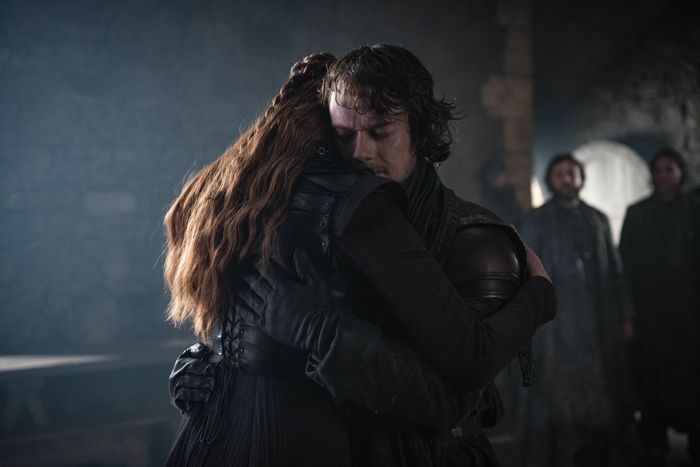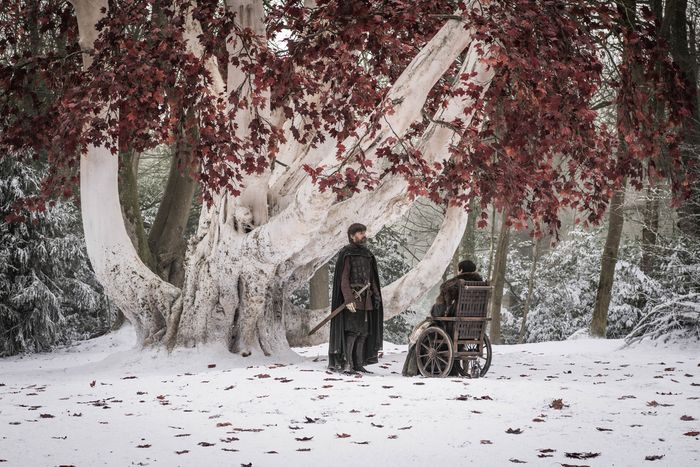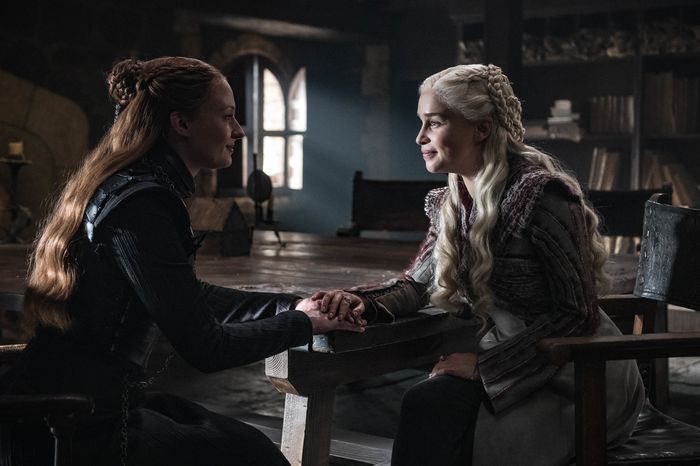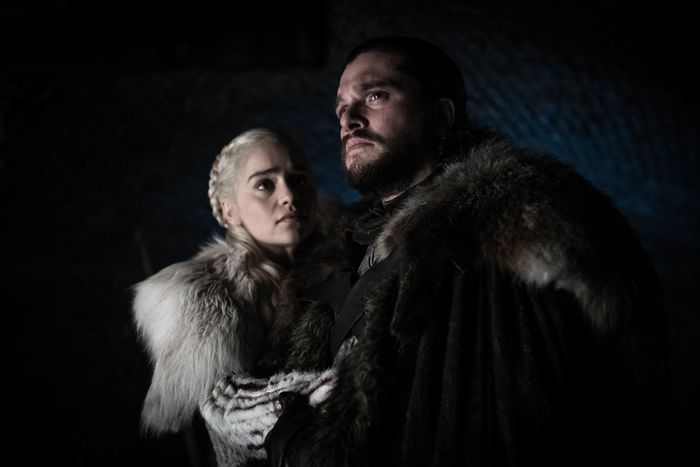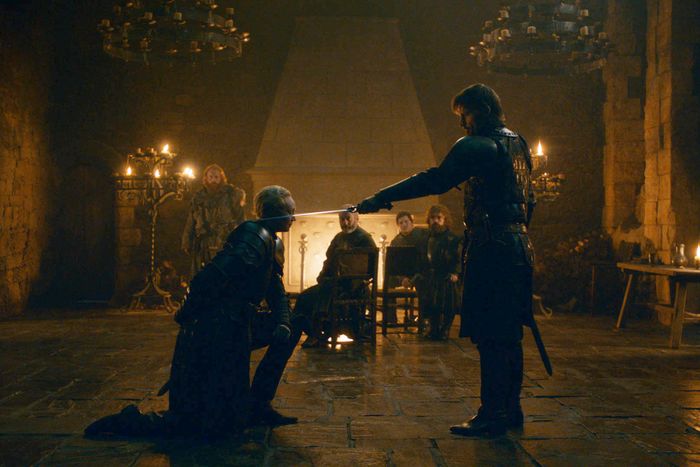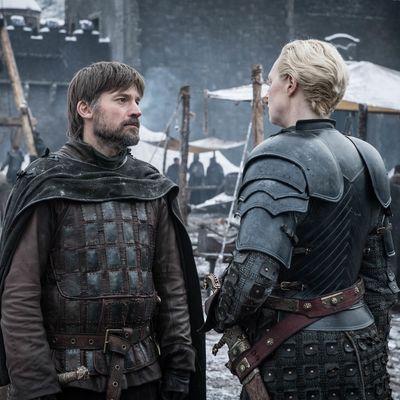
Game of Thrones writer Bryan Cogman says his original draft of “A Knight of the Seven Kingdoms” was a nightmare — and that the end result that aired last Sunday couldn’t have been more perfect. What happened in between? The same thing that happened with the countless characters who find themselves holed up in Winterfell before the battle against the White Walkers and the army of the dead: With the end looming, he dug deep into what really matters.
Starting out as an assistant to series co-creators David Benioff and Dan Weiss, Cogman served as the unofficial loremaster for the fictional world of author George R.R. Martin’s epic fantasy novels. From these humble beginnings he rose, not unlike a Game of Thrones character, to become co-executive producer and write 11 episodes of the show himself. “A Knight of the Seven Kingdoms” is the last of these, and one of the best as well. It portrays our heroes’ potential last hours with humor, intimacy, and elegance; in many cases, it’s likely to be the last time we spend time with them at all.
During a lengthy interview earlier this week, Cogman took us on an in-depth tour of Winterfell on that fateful night, examining pivotal scenes from Arya and Gendry’s long-deferred liaison to Jaime and Brienne’s powerful knighthood ceremony. Consider it Cogman’s own farewell as he leaves the world of Westeros behind. “It was a nice respite from all the mayhem,” he says. “The mayhem is important, and the mayhem is going to be incredible, you know? But I was happy to go out on this note.”
This was the first Game of Thrones episode that took place entirely not just in one general location, but in one building.
That’s true! That made it, by far, the hardest script of the 11 that I’ve had to write. Without question.
The final episodes of any show, but particularly this show, move at a breakneck pace. So I was delighted that the guys proposed this “last night on Earth” story to me, gathering of all of these characters in one place and taking stock of who they are. It’s like taking a breath. There’s a practical reason for it, too: You get information about geography and battle prep that will inform next week’s episode. But using place as a way to inform character was very important to us from the very beginning, and Winterfell is where it all began.
The purity of Winterfell is very important. As a place, it’s endured the same hardships as the family that inhabited it. It was taken and turned into a nightmare. For Sansa in season five, it was a hellscape to escape from. Then it was a hostage in and of itself, a place to win back and free. Now it’s not just that the Starks are back at Winterfell — it’s all of these families and factions and characters that were fighting for different things. They’re all here. Winterfell belongs to everyone now.
So that was the idea. The start of our battle episodes, whether it be “Watchers on the Wall” or “Blackwater” or “The Battle of the Bastards” — that 15, 20 minutes, half an hour of girding yourself — was going to be a full hour. I’m pretty sure a lot of the viewers thought that the mayhem was going to start right away. Maybe some would prefer that the mayhem had started right away. [Laughs.] But not me. The mayhem doesn’t mean anything unless you have some context. I wanted a feeling of grace. If it’s just the horror, the horror, the horror, that’s boring.
Since you brought up Sansa, let’s start with the scene where she and Theon reunite and embrace.
You should have seen me on set that day. I was a bloody mess. [Laughs.] It was a very important moment for me, for obvious reasons. I wrote the “wedding night” episode in season five, which was a huge turning point for Sansa and for Theon. They are the only two people in this world that know know what the other endured, because they both were the victims of this abuser — sexual victims, psychological victims, pretty much every way you can be victimized, he inflicted upon them. They both survived it. They’ve both come through it. They both have a very long way to go, but they know that they have each other.
I actually worked for a while on a dialogue scene between them where they talk all about it. I never even turned it in — it didn’t even make my first draft — and no one ever has read it but me. It felt like recapping something everyone had already seen. The audience knows what they endured. Those characters know what they endured. Having them talk about it felt forced, it felt contrived, it felt like I was writing a scene to answer my critics, which is not the reason you should write a scene.
And when you have actors like Sophie [Turner] and Alfie [Allen] and a director like David [Nutter], you don’t need that stuff. So a scene that I never got right became distilled to what’s there: “I’ve come to fight for Winterfell if you’ll have me,” and then that shot in the middle of the song where they’re sharing a meal together. They’re drawing strength from each other even now. Having them share that meal on what could be their last night in the world spoke volumes.
Moving to another Stark sibling, I wanted to talk to you about Bran and Jaime. Now that they’re reunited and Jaime is repentant, does he want something that Bran is beyond giving him?
My original draft of the script was a nightmare. It was the least well-received first draft I’ve ever turned in, in eight years of the show. [Laughs.] It read like a dull Wikipedia page. The Bran and Jaime scene was the perfect example — it was four pages where they’re just talking about everything. The guys, God love them, hit me hard with it. But they hit me with real notes, not “Here’s how you fix it” but “This is what needs to be fixed.”
Jaime is baffled by the fact that this boy hasn’t told the truth, and isn’t intending to tell the truth, and doesn’t want revenge. He can’t do the steps he needs to forgive himself until he feels some emotional reaction, negative or not, from this guy, and he’s not getting it. But whether it’s Bran himself speaking, or the Three-Eyed Raven, or a mixture of the two, he’s telling the truth: “It doesn’t matter. I know what your mind was at that moment, I know what your mind is now, I know what you’re here for, and it doesn’t do anybody any good to dwell on the past. We’re here now.”
Bran has a line that chilled me to the bone: “What makes you think there will be an afterwards?” It’s a question we’re wrestling with as a society right now.
Absolutely. The White Walkers are always have been the dread. Stephen Dillane [who played Stannis Baratheon] was an amazing actor to work with because he really needed the writer to explain what the hell they meant. “Why am I saying this? And you better have an answer for me that makes sense.” [Laughs.] I remember he and I were talking about a scene where he was speaking to Sam about the White Walkers. I remember Steven keying in on it and going, “Oh yeah, the dread.” And I thought, Yeah, that’s it. It’s not just death, it’s the dread. It’s the inevitability.
That little extended drinking misfit party sequence? None of that works if the undercurrent of inevitable end is not there. It informs all of it, right down to the bravado of Tormund’s origin story. Otherwise, it’s what people term “fan service.” It’s a term that I loathe, quite frankly. I think it’s a lazy way to criticize something. That said — [laughs] — this episode could very well have been fan service. My first draft was fan service. I don’t think the finished product is.
You brought up Tormund’s origin story …
Which was from the books! A lot of viewers did not know that.
Between his delivery and everyone’s dumbstruck reactions, it reminded me of The Golden Girls when Rose would tell a story about Saint Olaf.
Or when Sophia talks about Sicily! That whole sequence is a Golden Girls cheesecake scene! [Laughs.] I completely wrote a Golden Girls cheesecake scene. Oh, that’s hilarious. Fuckin’ hell, that’s what it is.
But that’s what people do, right? Ultimately, people want friends. People want fellowship. People want to break bread with someone for a minute and have a connection. And that’s what that scene was about. Everyone who’s been fighting and scraping and backstabbing and hurting each other and hurting themselves, when faced with something greater than any of them can comprehend, what do you do? You have a quiet drink with another human being. You tell a story. You try to have a connection. You sing a song. It’s fundamental stuff.
When I realized I could tell the origin story of his name in a way that would serve that, it was exciting. It’s one of those lovely times as a writer where you’re like, Oh, yes! I know where this goes! Tormund comes in. There’s the girl that he likes. Uh oh, who is this dude? This dude has a nickname? Well, I’ve got a nickname!
On the opposite end of the spectrum from that Golden Girls cheesecake scene, you have the conversation between Sansa and Daenerys. Even when they were smiling, you felt the stakes involved.
There’s something I keep wanting to remind people of: Sansa doesn’t watch Game of Thrones. Neither does Dany. They were not privy to the stories that we were. They only know what they know.
Sansa knows that of all the Starks that were ripped from Winterfell, she suffered the most to get it back. She’s the driving force for getting it back. Now she’s being told, “It’s not yours, and it’s not the Starks’ anymore. It belongs to Hitler’s daughter, the worst person in the world’s daughter, the daughter of the person who murdered your grandfather and uncle in the worst way possible. And guess what? Your brother, who you convinced to step up when he wanted to fuck off because of his death experience, bent the knee to her and is telling you that she’s your queen.” What part of Sansa’s reaction to any of this is irrational?
At the same time, if you’re Dany, this is the family that stole your family’s legacy. You grew up as a child living in constant fear that you were going to be murdered the next day. Then you’re married off to a warlord, and you’ve scraped and suffered and endured, and here you are. You’re going to help these people who destroyed your life and your family’s lives. Where’s the gratitude?
Now that the White Walkers have moved to the forefront as the true enemy, I think some viewers are impatient with the fact that the human characters still have human concerns.
They do! You can’t turn that off. It can manifest itself in upsetting ways, and it can manifest itself in ways that are beautiful and freeing. I’m thinking about Arya and Gendry’s scene. Arya has been spending the last several seasons in a state of self-inflicted dehumanization to cope. Being back in Winterfell amongst her family and humanity again has awakened a dormant humanity in her. She needs to feel these human feelings and these fundamental human impulses — sexuality, of course, being a huge one.
And in the end, she’s a young person and young people grow up. They have sex. Sex is fun! [Laughs.] What I love about the scene is it’s sexy, it’s romantic, and it’s kind of funny. It’s not a [dramatic voice] “Let me feel something, this is the last night in this world, hold me, the darkness is encroaching!” There’s a playfulness that she’s more than earned and deserves.
But again, we remember where we’ve been. I made sure to script that moment — and David shot it beautifully — where Gendry sees those horrible scars. Suddenly you’re jolted back into, Oh boy, these people have gone through a lot.
I was really touched by the scene where Davos and Gilly …
I was just about to bring up that scene. My original draft was a scene where Gilly and Davos, through a lot of contrived dialogue, figured out that both of them had been taught to read by Shireen Baratheon. That scene eventually evolved into the one that you see now: They both connect to this girl, and neither of them knows why the other has that connection. They never speak about it. They don’t know that Shireen gave them the same gifts. They just know that this child needs them in this moment and they both rally to empower and help her. Ramin [Djawadi] weaved Shireen’s song into the score in that scene, in a very subtle way. I was really happy with how that turned out.
In terms of the plot, the biggest conversation is Jon telling Dany the truth about who he is. Why would he reveal this extremely upsetting bit of information on the eve of battle?
I can tell you why: I don’t think he was going to … and she showed up. [Laughs.] He’s avoiding her the entire episode! But the problem is that Jon’s got no poker face. Jon would admit this! That makes me love him.
Down there [in the crypt], he’s processing, and Dany found him, and then there’s no avoiding it. What’s he going to do? Make up an excuse and walk out? She opens that door. She knows there’s something on his fucking mind. She starts talking about [her late brother] Rhaegar and this perception that Rhaegar is a rapist. Jon’s got to do it. He’s a fundamentally honest person and he loves her, so there’s no other choice.
So yeah, bad timing. But guess what? Life is full of bad times. He probably should have stayed in his room. [Laughs.]
Everybody has had a circumstance where you know something unpleasant and don’t want to talk about it, and then it just builds up inside until you can’t hold it back. It’s not a conscious process at all.
That’s the running thread throughout the episode: These are not things anyone expects to happen. No one walks into that hall expecting that Brienne is going to be knighted. We knew we were going to have Jaime knight Brienne, but it was very important to the guys that Brienne not be knighted on a hill with the sun setting and the wind billowing the capes and music playing. It’s not that at all.
The concept of the knighting scene, of Brienne being knighted by Jaime, gave birth to that extended “last six people at the wedding at 2:00 a.m.” sequence. No one knows what’s going to happen that night. What do you do? How do you connect? Finding all of these connections with each other, that’s the core of the episode.
As you watch Jaime throughout this episode, it looks like he’s fighting back tears because of all the things he has to atone for.
I don’t believe in the term “redemption arc.” I don’t know what the fuck it means. Do we have redemption arcs? No, we live our lives. We make mistakes. We take two steps backwards after taking five steps forward. There’s no such fucking thing as a redemption arc. I don’t believe in it. And I don’t think Jaime is on one, necessarily. Jaime’s just living his life and changing.
Yes, his heart is being ripped in two. But what I think he’s really doing is ripping down walls. Obviously I love the knighting moment, but I love the moment where he asks to serve under Brienne’s command almost as much. For someone like Jaime Lannister, that’s huge. That’s a vulnerability that he doesn’t allow people to see. It’s a process of allowing himself to love her, however you define love. I’m not necessarily talking about a romantic love — just opening his heart.
The old Jaime flouted convention just because he could. The way he began the knighting ceremony felt like one last glimpse of that Jaime: Fuck it, I can make a woman a knight — I’m Jaime Lannister! His motives are different, to put it mildly, but that’s still in him.
That’s why I don’t like that redemption arc thing. He’s still Jaime. It’s all there. The title of the episode is “A Knight of the Seven Kingdoms,” and obviously it refers to Brienne, but it’s about both of them. He truly is a knight of the Seven Kingdoms in this episode, maybe for the first time in his life.
And Brienne smiles!
I give full credit to David Nutter for that. In the moment, shooting it, I worried it was too much. I even went in and gave him a note, saying, “Can we get a take where she holds it together? She’s proud, obviously, and happy, but she can hold together.” And I’m soooo glad they used the smile. I couldn’t have been more wrong. Couldn’t have been more wrong!
This is why David is who he is, and the guys [Benioff and Weiss] are who they are. Like, they were right. When I first saw the cut that used that take, immediately I was like, “We could have wrapped five minutes early that day. Sorry, guys!”
But that’s the nature of this show. We’re collaborators, we support each other, with David and Dan as the leaders of this merry band. That is Game of Thrones. That’s the reason there wasn’t a lot of turnover. It starts at the top. I don’t think they get enough credit for that. Anything in this script I contributed that was of value is because I had them guiding me, teaching me, whipping me into shape, letting me know that I could do this long before I knew I could do this.
It was like your night-before-the-battle moment.
That was it. That was my swan song. I can retire now. But man, to be able to end my experience on Game of Thrones with something that celebrates the humanity of the show? Couldn’t have been more perfect.


